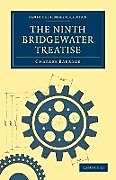The Ninth Bridgewater Treatise
Einband:
Kartonierter Einband
EAN:
9781108000000
Untertitel:
Englisch
Autor:
Charles Babbage
Herausgeber:
Cambridge University Press
Anzahl Seiten:
252
Erscheinungsdatum:
29.05.2009
ISBN:
1108000002
Klappentext In this 1837 book! Babbage! the 'father of the computer'! argues that science and religion are not diametrically opposed. Zusammenfassung Charles Babbage! mathematician! inventor and 'father of the computer'! was also a proponent of natural theology. In this book he draws a parallel between his work on the calculating engine and God as the divine programmer of the universe! and argues that there is no contradiction between scripture and science. Inhaltsverzeichnis Preface; 1. Nature of the argument; 2 Argument in favour of design from the changing of laws in natural events; 3. Argument to show that the doctrines in the preceding chapter do not lead to fatalism; 4. On the account of the creation, in the first chapter of Genesis; 5. Further view of the same subject; 6. Of the desire of immortality; 7. On time; 8. Argument from laws intermitting; 9. On the permanent impression of our words and actions on the globe we inhabit; 10. On Hume's argument against miracles; 11. A priori argument in favour of the occurrence of miracles; 12. Thoughts on the nature of future punishments; 13. Reflections on free will; 14. Thoughts on the origins of evil; 15. Conclusion; Appendix.
Klappentext
In this 1837 book, Babbage, the 'father of the computer', argues that science and religion are not diametrically opposed.
Zusammenfassung
Charles Babbage, mathematician, inventor and 'father of the computer', was also a proponent of natural theology. In this book he draws a parallel between his work on the calculating engine and God as the divine programmer of the universe, and argues that there is no contradiction between scripture and science.
Inhalt
Preface; 1. Nature of the argument; 2 Argument in favour of design from the changing of laws in natural events; 3. Argument to show that the doctrines in the preceding chapter do not lead to fatalism; 4. On the account of the creation, in the first chapter of Genesis; 5. Further view of the same subject; 6. Of the desire of immortality; 7. On time; 8. Argument from laws intermitting; 9. On the permanent impression of our words and actions on the globe we inhabit; 10. On Hume's argument against miracles; 11. A priori argument in favour of the occurrence of miracles; 12. Thoughts on the nature of future punishments; 13. Reflections on free will; 14. Thoughts on the origins of evil; 15. Conclusion; Appendix.

Leider konnten wir für diesen Artikel keine Preise ermitteln ...
billigbuch.ch sucht jetzt für Sie die besten Angebote ...
Die aktuellen Verkaufspreise von 6 Onlineshops werden in Realtime abgefragt.
Sie können das gewünschte Produkt anschliessend direkt beim Anbieter Ihrer Wahl bestellen.
Loading...
Die aktuellen Verkaufspreise von 6 Onlineshops werden in Realtime abgefragt.
Sie können das gewünschte Produkt anschliessend direkt beim Anbieter Ihrer Wahl bestellen.
| # | Onlineshop | Preis CHF | Versand CHF | Total CHF | ||
|---|---|---|---|---|---|---|
| 1 | Seller | 0.00 | 0.00 | 0.00 |
